T Beyond the Horizon
he New Horizons for Care Campaign has been a huge success. It was launched by The Eye & Ear Foundation in 2016 with a goal of reaching $80 million by the end of 2023. Seven short years later, thanks to all our Sight + Sound readers who have contributed, the goal has been surpassed.
Spurred by the growth of the Departments of Ophthalmology and Otolaryngology at the University of Pittsburgh, EEF CEO Lawton Snyder said at the campaign’s inception, “We saw an opportunity for Pittsburgh to be a world leader in finding new ways to advance care, first in our backyard, and ultimately the rest of the world.” Raising and distributing philanthropic dollars to the Departments fulfills EEF’s mission to support research to improve how we hear, see, and live.
We have seen the impact of the campaign in many ways in both Departments through the growth of research teams, new programs, bold initiatives, and rise in national rankings. This issue of Sight + Sound is devoted to this monumental accomplishment, with articles highlighting what the campaign has supported. We know that this is only the beginning of what needs to be done to make the type of impact Pittsburgh can make in these areas, but we are very proud of the accomplishments thus far.
CONTRIBUTIONS: $81,601,184
2024 News for Supporters and Friend s
SPRING EDITION
In This Issue Pittsburgh Hearing Research Center | Tinnitus 2 Optic Nerve Regeneration 3 Age-Related Macular Degeneration | Retina 4 CREATES/Skull Base Surgery/ Surgical Innovation 5 Making Care Available to All 6 Head Neck Cancer/Survivorship 7 Cornea Back Cover All stories written by Lisa A. Goldstein
FY16 FY21 FY17 FY22 FY18 FY23 FY19 FY24 FY20 CAMPAIGN CONTRIBUTIONS $3,477,865 $5,006,566 $4,290,190 $10,103,622 $5,718,480 $24,337,086 $7,266,327 $10,214,948 $11,186,102 TOTAL

Pittsburgh Hearing Research Center | Tinnitus
During the Campaign, the Department of Otolaryngology recruited four PhD level scientists who have established labs at the University of Pittsburgh, all studying different areas of the brain and the ear as they relate to understanding, preventing, and improving hearing loss (Chris Cunningham, Michelle Insanally, Melissa McGovern, and Ross Williamson).
Thanos Tzounopoulos, PhD, continues to work on strategies to understand and target tinnitus in the brain, and is doing exciting work to develop pharmaceutical products that will, eventually, provide a solution. He recently announced a breakthrough study that uncovered a biologic reason for noise-induced hearing loss. The end goal will be a pill that could be taken preventively or soon after exposure to mitigate damage.
Research in other parts of the ear and brain is also developing to target genetic causes of hearing loss, and toward more translational goals of creating an adaptive, improved new generation of cochlear implants.
The growth in hearing science research, according to outside scientific advisors, makes the University of Pittsburgh one of the strongest groups focused on hearing loss in the country.
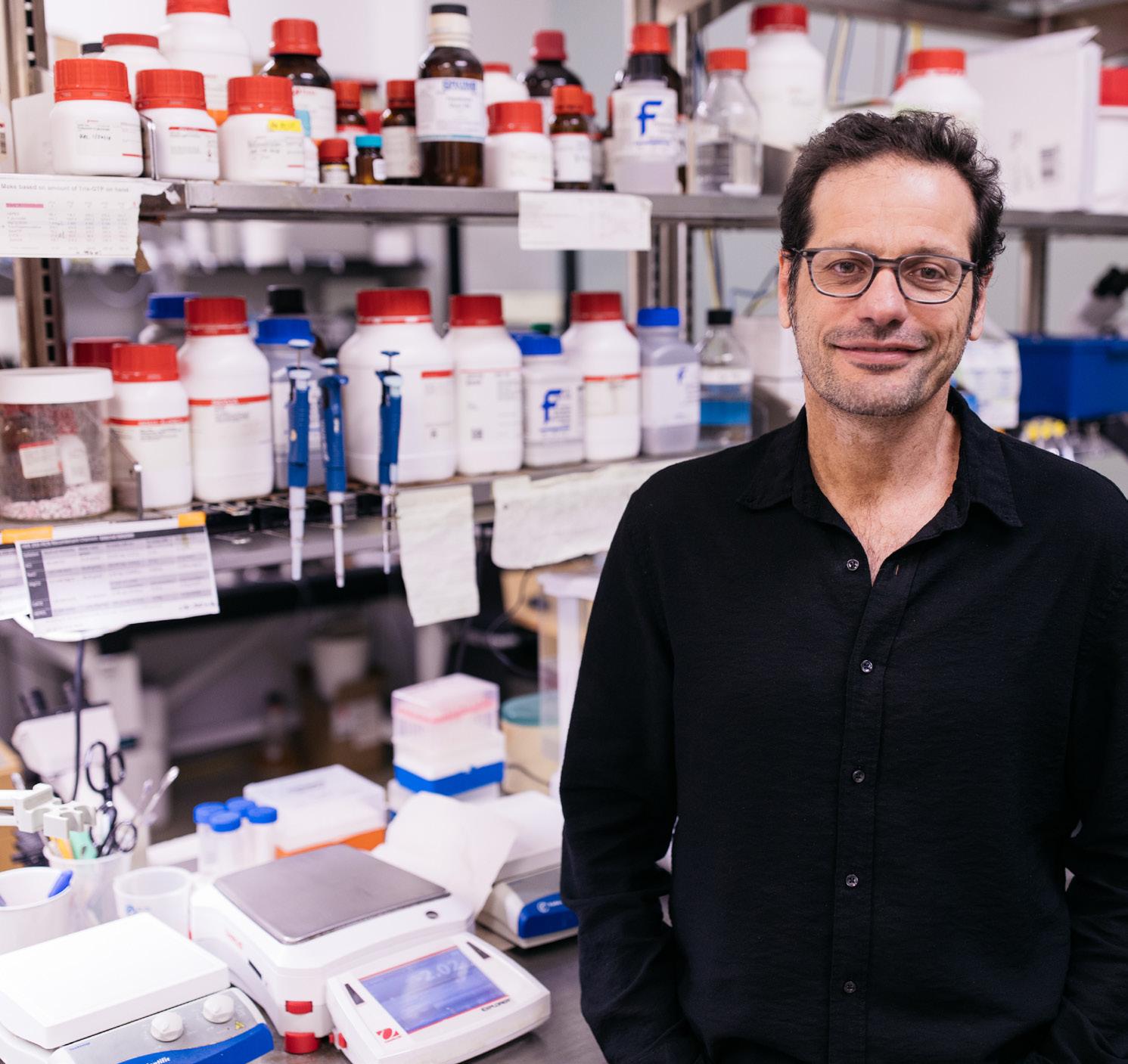
2
Thanos Tzounopoulos, PhD, Director, Pittsburgh Hearing Research Center
DID YOU KN W... that the Department of Audiology has audiologists who specialize in caring for people with tinnitus?
Optic Nerve Regeneration
During the campaign, the Eye & Ear Foundation has invested heavily in optic nerve regeneration, thanks to many very faithful generous donors, including Louis J. Fox. The number of faculty working directly on optic nerve regeneration in the Louis J. Fox Center for Vision Restoration has grown to include Drs. Issam Al Diri, Kun-Che Chang, and Taka Kuwajima. This past summer, Dr. Larry Benowitz joined the Fox Center team to provide senior leadership to the group.
The Louis J. Fox Center for Vision Restoration is working on several innovative techniques to regenerate the optic nerve. One example, in collaboration with Dr. Steven Badylak’s lab, is a multi-model application of MBV (a derivative of extracellular matrix). In tandem, a statin (Baycol) utilized by Dr. Kuwajima was recently tested in a large animal trial in collaboration with Wake Forest University.
The preliminary results are very promising for this and other technologies coming out of the Fox Center. Although there are no clinical trials at this time, this group is very focused on bringing these technologies to patients.
Additionally, the Louis J. Fox Center brings together leading scientists from around the world annually for a conference on optic nerve regeneration. The most recent Fox Center conference was held in October 2023 at the new UPMC Vision Institute.
Regenerating the optic nerve is a very ambitious goal, equivalent in manpower and effort to putting a man on the moon. Pittsburgh is proud to lead the way in these efforts, and we will continue to work with institutions around the world to find solutions for patients.
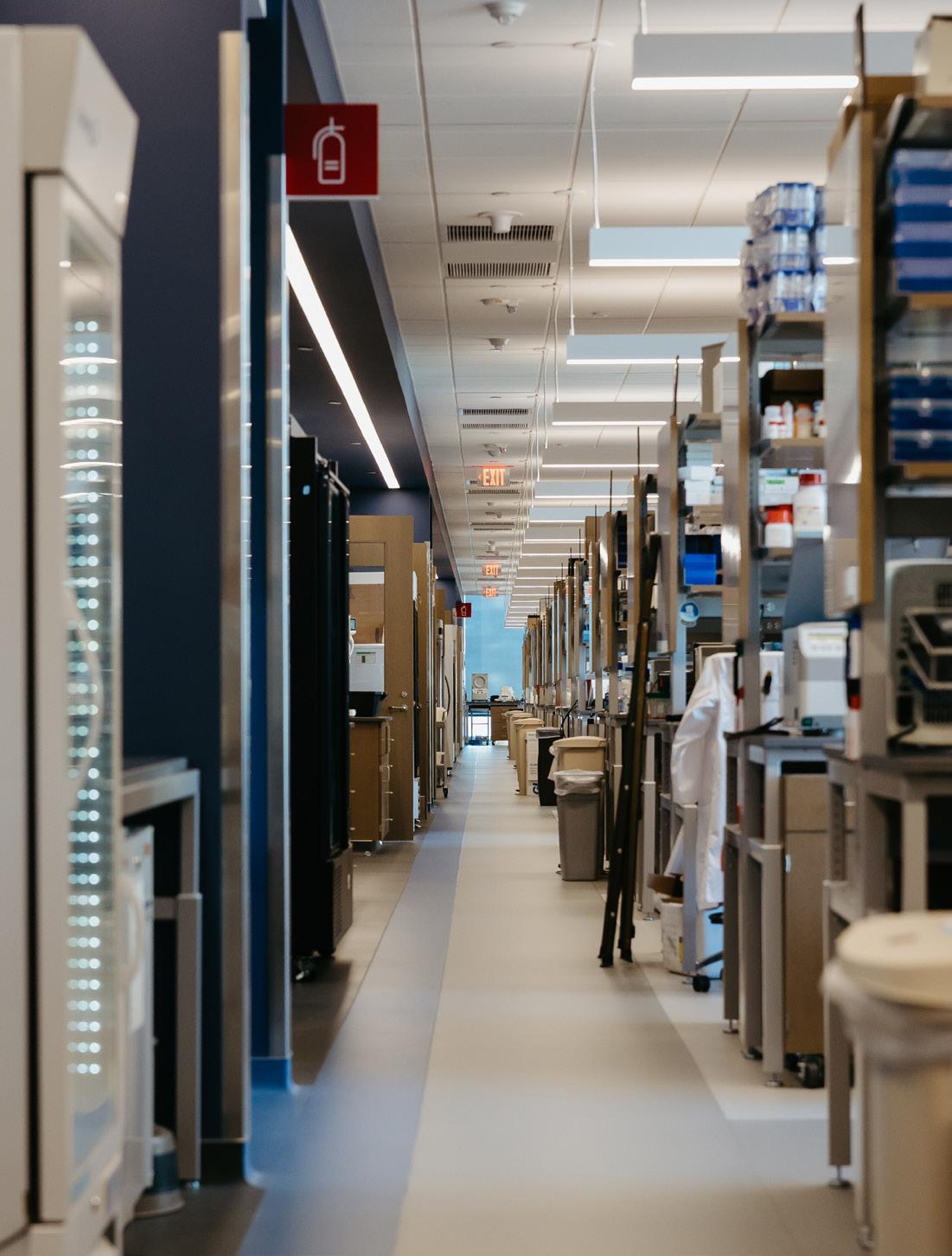

DID YOU KN W... that when you enter the Vision Institute lobby, you will be greeted by a member of the Concierge Team who will help you get to your appointment?
3
Louis J. Fox Vision Restoration Center
Age-Related Macular Degeneration | Retina
Diseases and disorders of the retina are major contributors to blindness. Age related macular degeneration falls into this category, and is the leading cause of blindness, affecting 1 in 10 Americans ages 50 and older. When Dr. Sahel arrived, increasing the Department’s research focus on the retina was a primary objective.
Thanks to the campaign, Dr. Sahel was able to recruit several key researchers. Ethan Rossi, PhD, was the first one to join the Department from the University of Rochester. He is an expert in deep imaging of the eye, which allows for retina diseases to be identified much earlier than previously possible. Only six devices in the world house a rare kind of imaging technology called laser doppler holography. Three are in Paris and two are in other parts of France. Dr. Rossi’s lab has the only one in the U.S. and the only one outside of France. This technology makes it possible to see functional activity in the retina with high precision. Dr. Rossi said the technology has a lot of potential applications beyond what they have been starting to view.
Leah Byrne, PhD, came to the University of Pittsburgh from UC Berkeley. She utilizes CRISPR to act as a “trojan horse,” inputting genetic information into diseased retinas. The hope is to find different techniques to help cure AMD/retina. Dr. Byrne launched the Pittsburgh Gene Therapy Bootcamp, aimed at graduate students and postdocs looking to gain experience in the field of gene therapy. She received the 2023 University of Pittsburgh Office of Innovation Emerging Innovator Award.

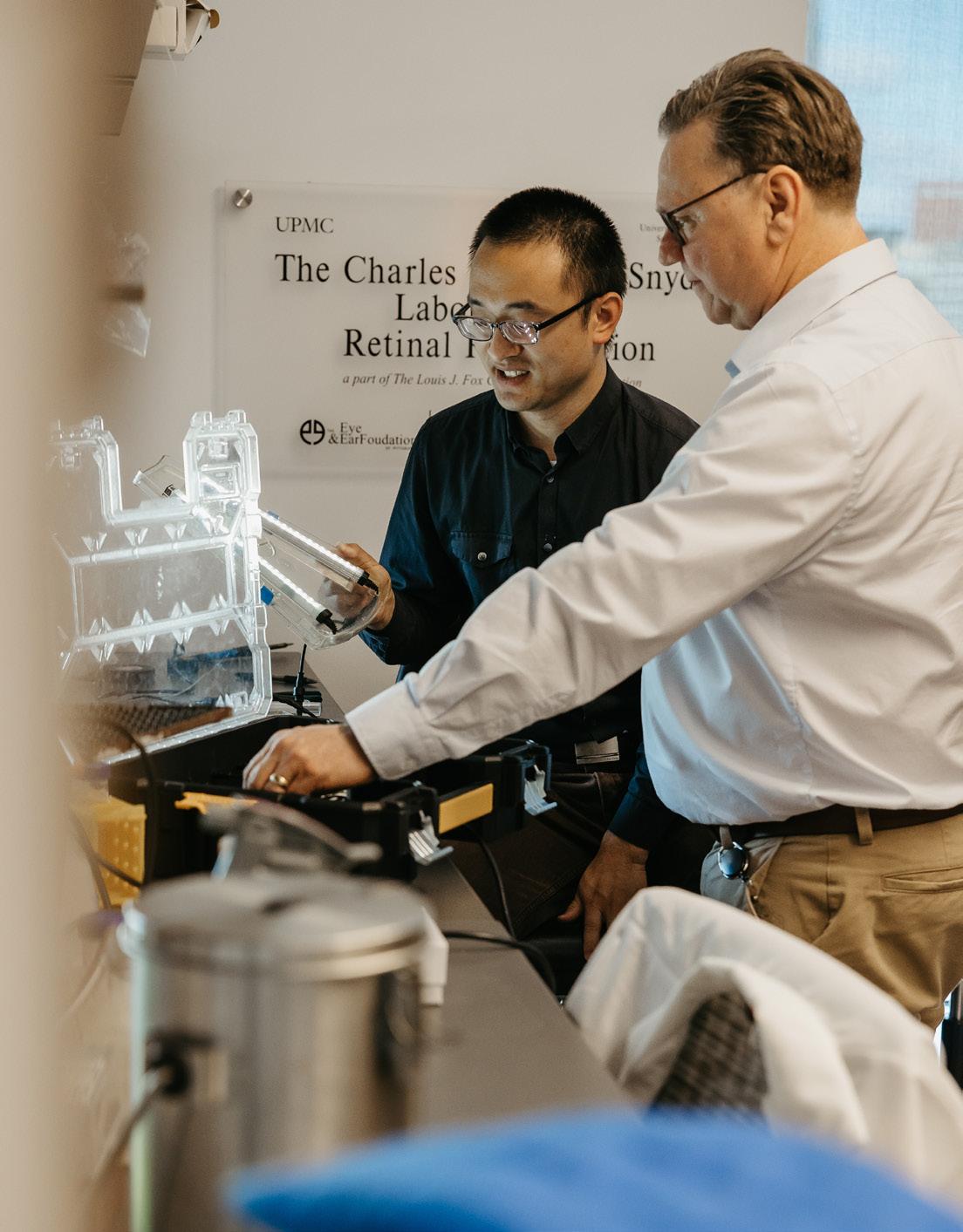
Debasish Sinha, PhD, joined the Department from Johns Hopkins University as the Jennifer Salvitti Davis, MD Chair in Ophthalmology Research. He brought his entire lab with him when he came to Pittsburgh. His work has been identified by pharmacology companies as viable molecules to bring to market. In 2021, he received the Wiegand Entrepreneurial Research Award for his research project that is a unique pharmacological approach targeting inflammation in the early stages of AMD. In 2023, Dr. Sinha received the Edward N. & Della L. Thome Memorial Foundation Award for Age-Related Macular Degeneration Research.
John Ash, PhD, was recruited from the University of Florida as the Director of Research and is the E. Ronald Salvitti Chair in Ophthalmology Research. Dr. Ash was hired to replace Dr. Jeff Gross, who was already building the Department’s reputation for excellence in research. Dr. Ash’s work is also focused on retinal regeneration research, with a strong emphasis on translational research. It is safe to say, thanks to the New Horizon’s for Care Campaign, that Dr. Sahel has assembled one of the strongest retinal research teams in the country.
4
John D. Ash, PhD, E. Ronald Salvitti Professor of Ophthalmology Research, Vice-Chair of Ophthalmology and Director of Research
Blood vessels imaged with Laser Doppler Holography © 2024 Rossi Lab
CREATES/Skull Base Surgery/Surgical Innovation
The Department of Otolaryngology at the University of Pittsburgh School of Medicine has a unique center called Pittsburgh CREATES (Collaborative Research, Education And Technology Advancement in Surgery). CREATES received a $1 million grant from the English Bonter Mitchell Foundation for a joint surgical cognition project with Parkview Health System in Ft. Wayne, Indiana.
Scientific goals include establishing new metrics for video evaluation of surgical performance and exploring new measures of surgical performance. Expected outcomes include identifying students and physicians with greater aptitude for surgery, developing improved, standardized training methods, improving surgical performance and post-operative outcomes, and deploying technology to improve access to these methods.
CREATES was also the recipient of approximately $400K in funding from Department of Otolaryngology alumni for carts and other equipment with the intent of developing a state-of-the-art training center for the Department of Otolaryngology.
The Myers/Maroon Chair in Skull Base Surgery has been funded by lead gifts from SBS pioneers Eugene Myers and Joseph Maroon, along with other donors such as EEF Board members, patients, and Otolaryngology alumni. Dr. Carl Snyderman is the intended recipient. This chair will commemorate the pioneering SBS work of Drs. Myers and Maroon while also encouraging the training of the next generation of skull base surgeons.

In the surgical innovation area, several grants have been received from the Edith Trees Foundation/PNC Charitable Trusts for the development of equipment to be used in surgery on individuals with special needs, as their windpipes are a bit trickier to maneuver.
Additionally, CREATES continues to work with companies on new products that have input from surgeons during development on what is needed in surgery as well as products that may be helpful in overcoming problems in the operating room.
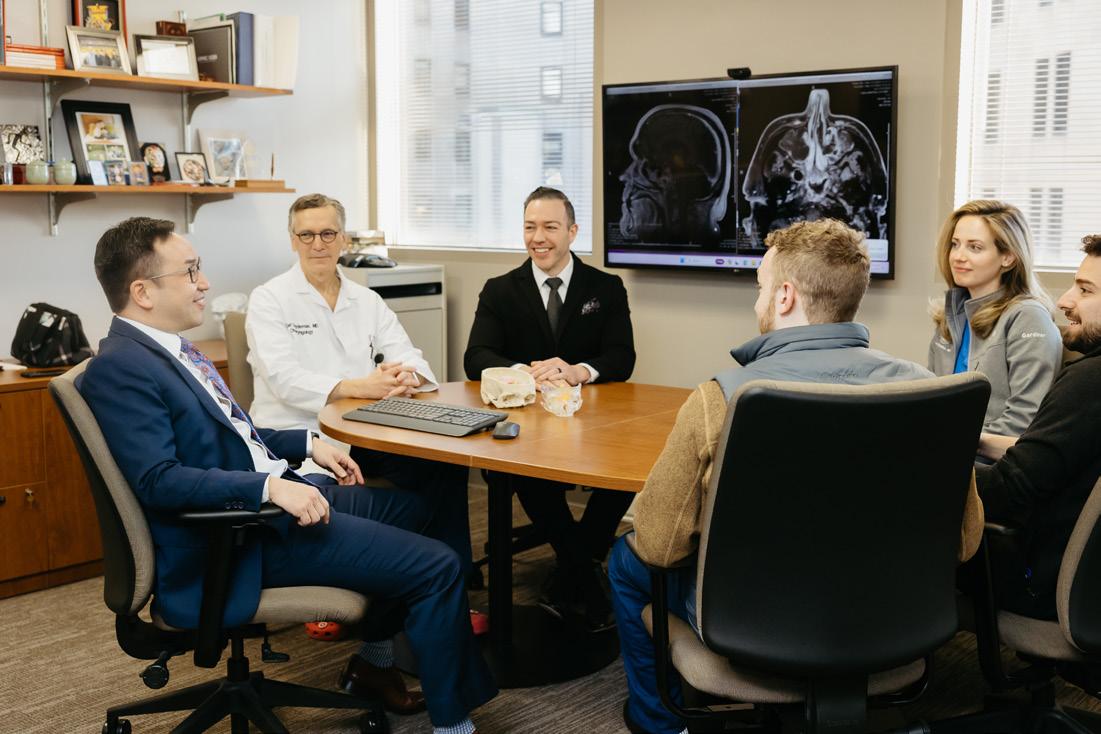
DID YOU KN W... that the Voice Center is a partner to performing arts organizations in Pittsburgh, including the Civic Light Opera and the Pittsburgh Opera?
5
Skull Base Surgery Team
Making Care Available to All
Community care has long been a focus point in the Departments of Ophthalmology and Otolaryngology. In the past few years, however, both Departments -- along with the Eye & Ear Foundation -- have placed a greater emphasis on access to care, social determinants of health, and ensuring that everybody has access to the world class care taking place in our Departments. While some of these programs have existed for many years, new initiatives are hitting their stride thanks to the formation of the Eye & Ear Foundation Community Outreach Committee. Consisting of Board members, physicians, and community members, this committee’s goal is to strategize and create partnerships that can further the goals of the Foundation and Departments while engaging in nontraditional care delivery.
In Ophthalmology, Dr. Jake Waxman continues to lead efforts of the Guerilla Eye Service (GES) to provide free community vision screening clinics around the Pittsburgh region and beyond. These efforts were greatly enhanced in 2023 when the Brother’s Brother Foundation donated a $150K customized eyeVan for this work in the community. The Department also added Dr. Andrew Williams to the faculty. Dr. Williams, who is a glaucoma specialist, has research interests that include access to care, social determinants of health, and how to better reach the patients that need our care. This addition will help the Department tackle growing problems such as glaucoma, diabetic retinopathy, and macular degeneration in our community.
On the Audiology front, Dr. Catherine Palmer and her team have addressed community care needs for hearing loss with programs like as HearCare (which makes assisted living facilities more accessible) and HEAR-UP (running free clinics to fit hearing aids). Recently, Dr. Palmer developed LiDIA, an affordable, compact device that can be used as both a hearing screener and amplifier for patients in various medical clinics, such as primary care practices.
The Departments are also working on joint community projects together. In 2022, both Ophthalmology and Otolaryngology began participating in the annual Mission of Mercy, a two-day free health care clinic held at the Pittsburgh Convention Center. Over the past two years, the Eye & Ear Foundation has raised over $200,000 to provide free eye exams, glasses, hearing exams, hearing aids, and otology care to over 1400 patients.
Additionally, with a $412,000 grant from the Eden Hall Foundation, both Departments are collaborating on the THRIVE program. Using a community stakeholder approach, clinical care teams are creating a training program for community health workers to address hearing and vision health in their communities. We hope that this program is something that can be implemented not only here in Pittsburgh but shared with other organizations and care providers around the country.
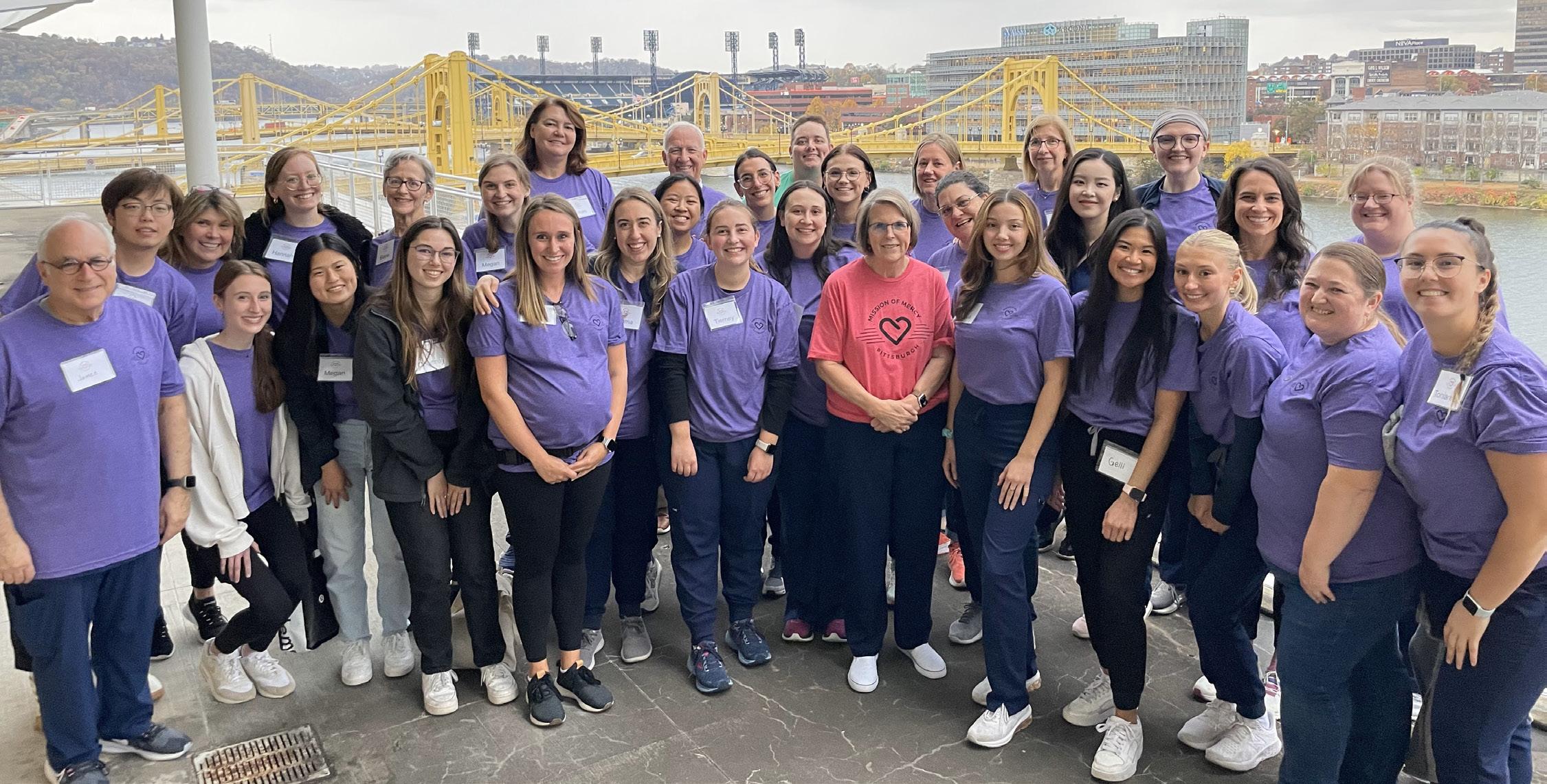
6
Mission of Mercy 2023, a group of our volunteers
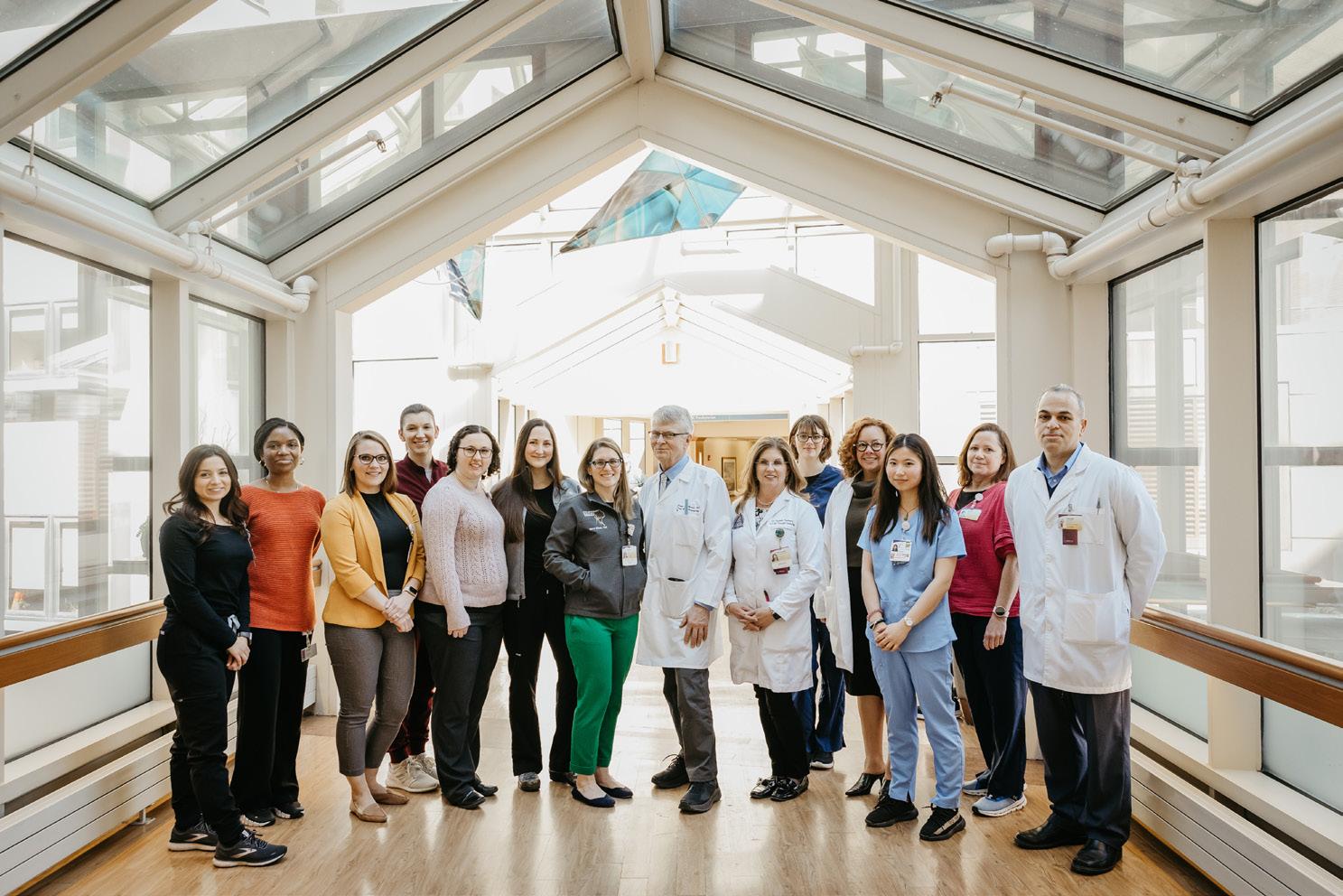
The Head Neck Cancer (HNC)/ Survivorship program saw a lot of growth during the Campaign, especially in the services it now provides to patients. PNC Charitable trusts has sponsored many projects related to patient navigation, basic science research for early detection of cancers, and the study of cancer pain in HNC patients. The Jack Buncher Foundation has also provided support to the Department of Otolaryngology for the Survivorship Clinic and projects in clinical research.
This funding support allowed two patient navigators joined the head and neck surgical oncology team. They follow each case of head and neck cancer from diagnosis through treatment and into survivorship.
Three HNC surgeons joined the Department in 2023: Drs. Kevin Contrera, Jessica Maxwell, and Matthew Spector. Dr. Spector is the new Division Chief of Head and Neck Surgical Oncology and Microvascular Reconstructive Surgery. He is among the most experienced and innovative head and neck reconstructive surgeons in the United States, having
previously co-directed the head and neck cancer program at the University of Michigan. Dr. Spector also leads the Advanced Head and Neck Surgery Fellowship and has already elevated the reconstructive surgery program to new heights. Dr. Maxwell is a highly experienced head and neck surgeon who will serve as the Otolaryngology Chief at the Pittsburgh VA as well as Associate Residency Program Director. She will focus her efforts on expanding otolaryngology-head and neck surgery care for veterans and building a head and neck cancer research program at the VA. Dr. Contrera joined this past fall after completing a two-year fellowship in head and neck surgical oncology and reconstruction at MD Anderson Cancer Center. In addition to complex surgery, Dr. Contrera will devote time to developing his career as a surgeon-scientist with mentorship from Dr. Ferris and others at UPMC Hillman Cancer Center.
Additionally, the Department is developing a three-step program to address disparities for HNC patients with intellectual and developmental disabilities.
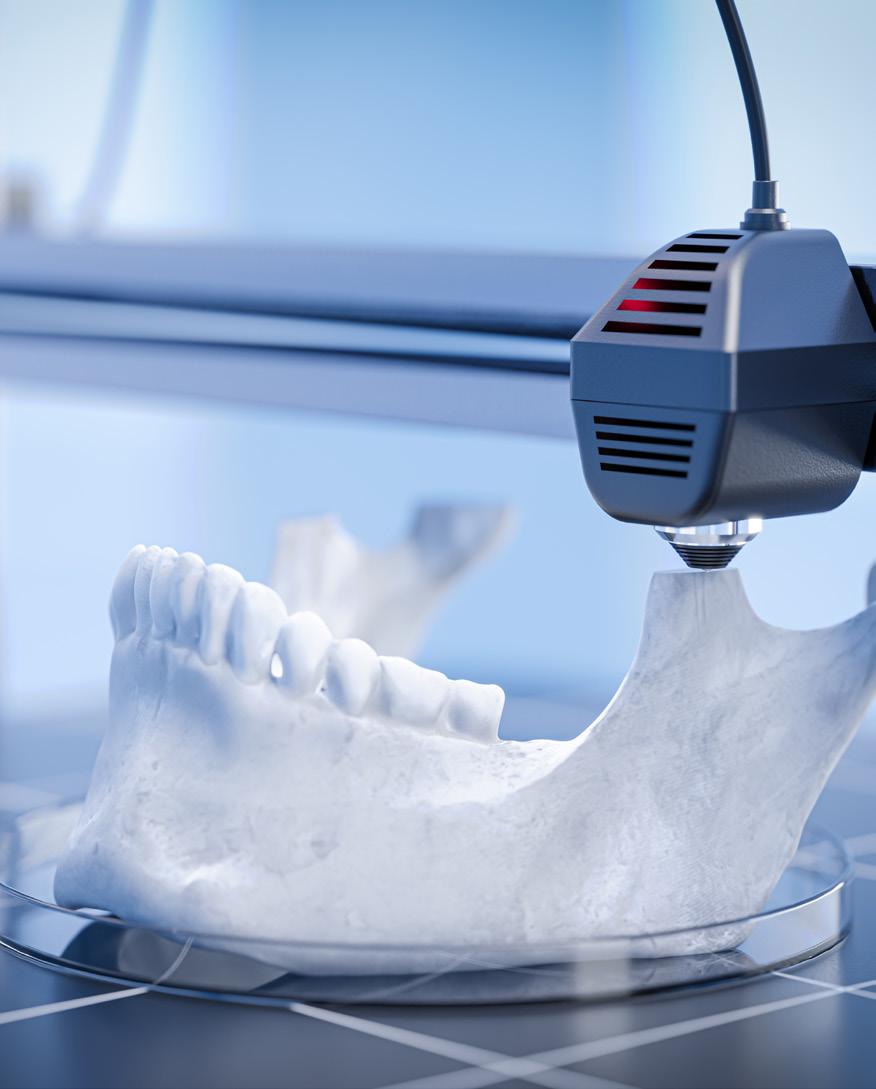
DID YOU KN W... that Pittsburgh has new technology like 3D modeling, 3D printing, and biomedical engineering that can be used to help rebuild the jaw, maxillary, and upper cheeks in patients with head and neck cancer?
7
Survivorship Clinic Team
eyeandear.org
UPMC Eye Center (412) 647-2200
University Ear, Nose & Throat Specialists of UPMC (412) 647-2100
If you no longer wish to receive our newsletter, please submit requests to our mailing address, or email optout@eyeandear.org
The official registration and financial information of the Eye & Ear Foundation may be obtained from the Pennsylvania Department of State by calling toll free, within Pennsylvania, 1-800-732-0999 Registration does not imply endorsement.
The Eye & Ear Foundation of Pittsburgh is a nonprofit 501 (C)(3) organization. Our mission is to support the research and academic efforts of the Departments of Ophthalmology and Otolaryngology at the University of Pittsburgh. Donations to support our research initiatives can be made online at eyeandear.org or by returning the enclosed envelope. For more information on the Foundation, our research, or the articles in this newsletter, please contact Katherine Troy, Director of Operations, at katherine@eyeandear.org or 412-864-1300.
Medical Disclaimer: The Eye & Ear foundation does not assume any responsibility or risk for the use of any
risk. All information and content found in this newsletter were created for
by visiting the eyeandear.org website.
Cornea
Thanks to support from Eye & Ear Foundation donors, under the leadership of the late Dr. Jim Funderburgh, scientists in the Department of Ophthalmology learned to use corneal stromal stem cells (CSSCs) to restore corneal transparency. While this treatment is still in the process of FDA approval in the United States, clinical trials in India using this method have already restored sight to dozens of individuals. This procedure could potentially provide a rapid non-surgical regenerative therapy for corneal scarring and replace the need for cornea transplants in many instances in the future.
Following Dr. Funderburgh’s passing in 2019, Dr. Gary Yam was recruited to the University of Pittsburgh to carry on this work. The project was renamed the Funderburgh
Corneal Regeneration Project in honor of Dr. Funderburgh. Dr. Yam and his team are expanding the work by looking at gene expression measurements, expanding the use of stem cells to other conditions such as corneal haze, and working with ECM Therapeutics, a company working on extracellular matrix work. Dr. Yam and his team are also looking at RNA sequencing data from the three sets of samples (CSSC, keratocytes and fibroblasts) to help treat corneal scarring from injury.
Additionally, and importantly, the Department is looking at biomanufacturing processes to manufacture the stem cells right here at the University so that they have the tools necessary to begin human clinical trials when the time comes.
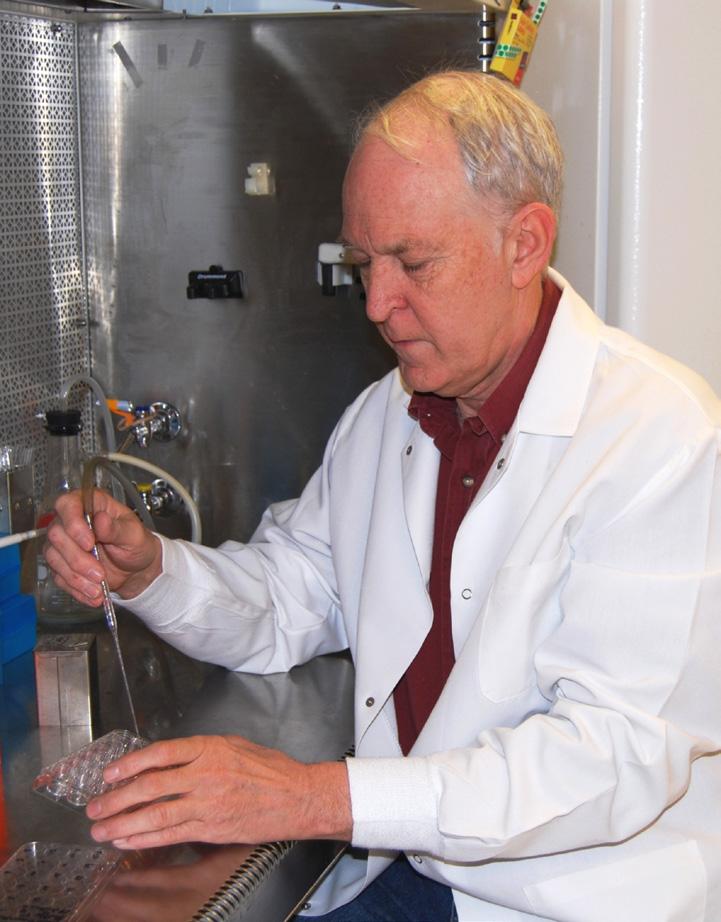
NONPROFIT ORG U.S. POSTAGE PAID PITTSBURGH, PA PERMIT NO. 612
203 Lothrop Street Suite 251 EEI Pittsburgh, PA 15213 412.864.1300 O 412.864.1305 F
information contained within
newsletters. Reliance on any information available through the newsletters is solely at your own
educational purposes only. The newsletter is not intended as, or as a substitute for, professional medical advice, diagnosis, or treatment. Always seek the advice of
physician
another qualified health provider
any questions
may have regarding a medical condition. Never disregard professional medical advice or delay in seeking it because of something you have read in the newsletters.
view
full disclaimer
the
your
or
with
you
We encourage you to
our
The late James L. Funderburgh, PhD












